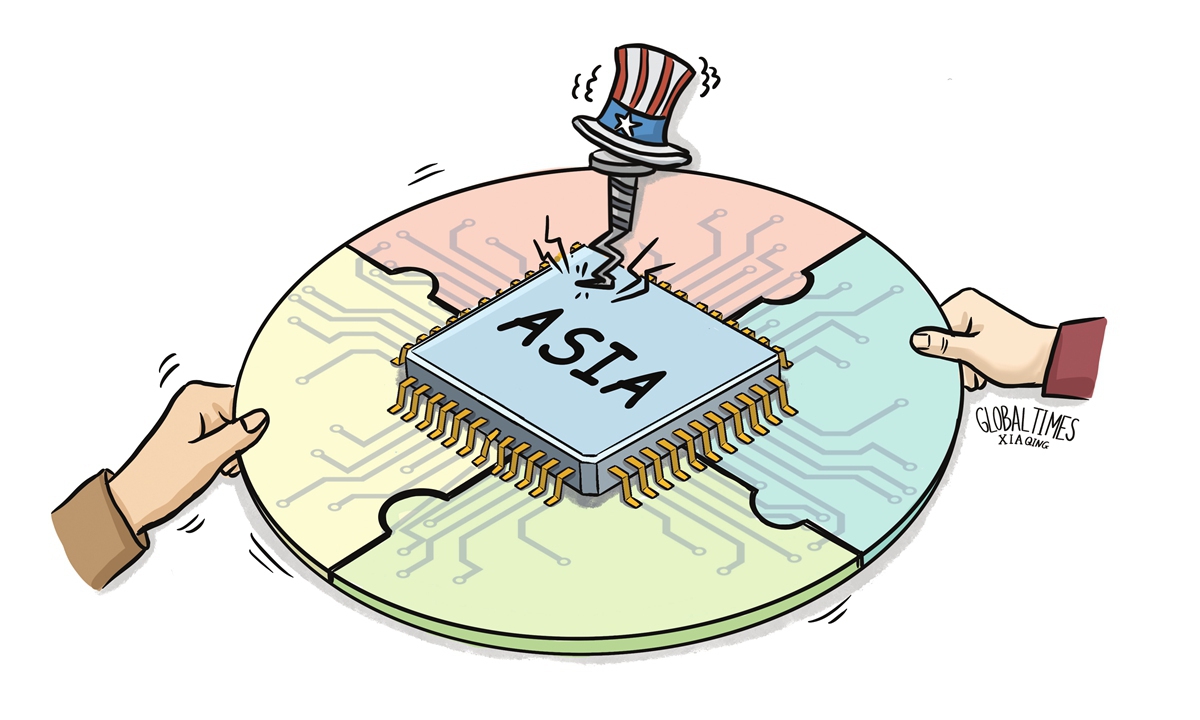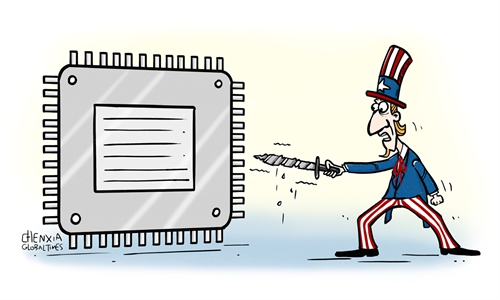
Illustration: Xia Qing/Global Times
China's cooperation across the global semiconductor supply chain has not eroded, but has instead strengthened despite the US escalation of its anti-China crackdown. The latest example is a Reuters report on Monday that said China's securities regulator has given the greenlight to the country's first mutual fund targeting top Chinese and South Korean chipmakers.The exchange-traded fund (ETF) will invest in top Korean semiconductor firms including Samsung Electronics Co and Chinese chip-making giants. "The Chinese and Korean semiconductor industries are expected to be closely integrated," Reuters said, citing comments made by the operator who is going to run the fund.
Reuters' report came after the US stepped up a crackdown on selling US technology to China. The US government on Friday announced sweeping new limits on the sale of semiconductor technology, under which US politicians are trying to cut China off from certain semiconductor chips made anywhere in the world with US equipment.
When the US made this crazy move aiming to cripple China's ability to make advanced chips, it was inevitable that it would hurt the interests of its allies and almost everyone in the global semiconductor supply chain. According to media reports, Asian and European shares were mostly lower when trading reopened after the weekend as losses in technology and semiconductor sectors weighed on global benchmarks.
Business Korea said the US is increasingly curbing the growth of the Chinese semiconductor sector and this is posing an increasing burden on Samsung Electronics and SK Hynix, which are manufacturing products in China in close business relations with local companies. It's not just South Korean giants that will suffer a loss. While global top semiconductor makers feel great anxiety, it is very likely that Washington will exert further pressure on those firms to force them to serve the US national interest. Washington's irresponsible and selfish behavior will gradually eat away at its cooperation with allies and partners, resulting in profound changes in the global semiconductor supply chain.
China's semiconductor industry is showing signs of flourishing even in the face of US crackdown. According to Bloomberg, Chinese orders for chip-manufacturing equipment from overseas suppliers rose 58 percent in 2021, making it the biggest market for those products for a second year running. China is seen as a vital strategic market for global semiconductor makers. No matter how the situation changes, China will always play an important role in the global semiconductor supply chain, and that's why other players in the supply chain want to strengthen their cooperation with China despite the escalation of Washington's anti-China crackdown.
For instance, South Korea and China agreed in August to boost cooperation and communications on supply chains by setting up a new high-level consultative body, according to Yonhap News Agency.
First, if global companies want to survive the increasingly fierce international competition, they need export markets. Second, efforts to enhance cooperation with China will help those countries strengthen economic strength and increase their leverage in negotiations with the US.
The US escalation of its anti-China crackdown is disrupting the global tech supply chain, and we should not only stop the disintegration of the global supply chain, but also strengthen supply chain integration through efforts to push forward multilateral and bilateral cooperation.
China's attitude of continuing to open up its economy and strengthen economic and trade cooperation with the rest of the world is certain. A highly interdependent semiconductor supply chain has been formed among China, South Korea and Japan in the past decades, and now we need to further strengthen supply chain cooperation in East Asia and extend the supply chain to Southeast Asia and a wider area. If the US chooses to continue to split the industrial chain and hurt others' interests, the US economy will gradually isolate itself from the international community and the global supply chain.



